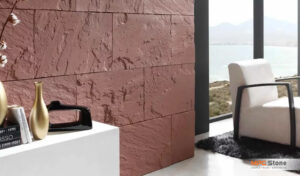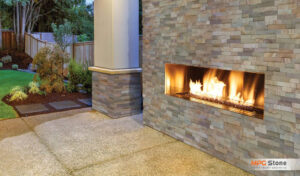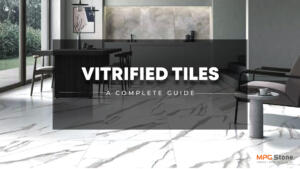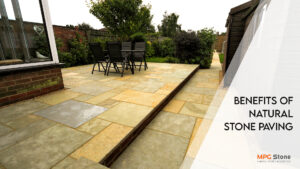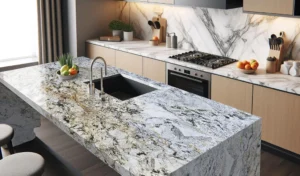Do you tend to dream about your ideal kitchen or bathroom? You may think about having sleek countertops, beautiful yet incredibly durable. If you are like many homeowners, you are probably thinking of quartz. But here is a million-dollar question: Is quartz a natural stone?
We know it is a little confusing. You hear “quartz” and naturally assume it comes straight from the Earth, like granite slabs. But the truth is a little more complicated. Let’s get into the ins and outs of quartz, discussing the different forms of this mineral, and help you figure out if it actually meets the definition of natural stone.
So grab a cup of coffee and get ready to learn! We’re going to look into the secrets of quartz and help you make the right choice for your home.
Understanding Quartz: A Detail Analysis

a. What is Quartz, Anyway?
To know Is quartz a natural stone?, we first need to know what quarts exactly is. This means while walking along a path, that part of a bright stone is most probably quartz! It’s one of the most numerous minerals found on the face of the earth; you can find it almost anywhere!
Quartz is silicon dioxide, which indicates that it is formed from an equally simple combination of two of the most common elements on earth. The simple structure of quartz provides it with some quite remarkable properties: it is hard and durable. It can withstand much wear and never gets scratched or heated; that’s great news for homeowners.
b. Natural quartz: Earth’s very own treasure.
You’d be surprised, but quartz is not one type of rock; it is one of the essential constituents found in many different rocks you may have heard about, such as granite and quartzite stones.
Just remember: quartz is the star ingredient; all other minerals can only be regarded as the supporting cast. In raw form, quartz gemstones are found in a wide and dazzling array of colors and patterns, from milky white to smoky gray to that brilliant purple of amethyst.
You have probably seen natural quartz draped around necks or adorning fingers; those beautiful rings and necklaces often incorporate radiant quartz crystals.
c. Engineered Quartz: A Modern Marvel
Engineered quartz is a bit of a different matter. It’s not exactly “natural” in the same way as a rock you’d find lying around. Thus, to make engineered quartz, manufacturers take natural quartz crystals and crush them into a fine powder. Then, they mix this powder with resins and pigments to make a strong, uniform material. Think of it as baking a cake, with the quartz powder as the main ingredient, while the resins and pigments provide the special color and strength.
So to answer, is quarts a natural stone? We can say that natural quartz is a natural mineral, while engineered quartz slabs is a man-made material. Natural quartz is used as the main component but has been altered quite differently from the method of production.
Okay, let’s get down and compare these two countertop materials! Here’s a quick rundown of how they stack up:
Property | Natural Quartz | Engineered Quartz |
Durability | High | Very High |
Heat Resistance | High | Very High |
Stain Resistance | Moderate | High |
Maintenance | Requires sealing | Low maintenance |
Appearance | Natural variations | Consistent, uniform colors |
Cost | Generally higher | Generally more affordable |
- These are two of the hardest surfaces known to the world. You can be reckless enough to drop a heavy pot on it or chop vegetables. Engineered quartz may be a little harder, as it has a composition that is uniform throughout the whole stone.
- They are both very good at heat resistance. Having the properties of natural stone tile, hot pans can be placed directly onto either surface without fearing burns or damages.
- It’s here where they really differ. Natural quartz is easily stained by substances such as wine or oily fats; its engineered counterpart, however, has a non-porous covering, which makes it highly resistant to stains.
- Natural quartz needs sealing every now and then, while engineered quartz is almost maintenance-free! In fact, if you wiped it with soap and water, it’ll do just fine.
- Natural quartz has the unique veining, swirling, and coloring that is found with nature. It is practically an original work of art in a kitchen. On the other hand, engineered quartz shows a more uniform appearance, with a wide range of solid colors and subtle patterns.
Consider Your Lifestyle:

a. For durability!
Since your cooking area is teeming with both kids and critters, it might be better to opt for engineered quartz. There’s no denying that it is very hard-wearing and, hence, highly functional for family life.
b. Looks matter!
If you find yourself drawn by the exotic looks of natural stone, with its flowing patterns and fascinating hues, then natural quartz is the way to go. It lends a touch of personality to your cooking space.
c. Low maintenance!
Let’s face it; who has the time to constantly maintain their countertops? This is where engineered quartz becomes the ideal candidate. It can typically be cleaned with surface-level wipes like porcelain slabs.
d. Budget is a priority!
Engineered quartz is usually less expensive than its cousin, natural quartz.
Selecting the ideal countertop, however big a decision it may be, shouldn’t scare you from calling an expert! A kitchen countertop installer or kitchen designer can provide further guidance according to your needs. They can assess everything about your lifestyle, discuss your budget, and show you samples of both natural and engineered quartz to allow you to think about how it might look.
So now that you know is quartz a natural stone or a man-made one, Thus, your own need and taste will weigh in more heavily on your best choice rather than the other advances. There is, in any case, no one right or wrong; it is all about the right fit for your home and your lifestyle.
Debunking Common Myths: Setting the Record Straight

Let us address some of the most common myths surrounding quartz countertops. You might have heard these going around, so let’s clear the air!
- Myth: “Engineered quartz is not durable.”
Reality Check: This couldn’t be further from the truth! Engineered quartz is registered as incredibly durable, like marble slabs. It resists scratches, chips, and so on. In fact, you can place hot stacks directly on it and not worry about damage. Some homeowners actually find engineered quartz to be more durable than natural stone.
- Myth: “Engineered quartz looks fake.
Reality Check: Engineered quartz maintains a more consistent look compared to the natural variations of natural quartz, but that doesn’t denote it exactly looking fake. Modern manufacturing has come a long way, and many engineered quartz options feature subtle veining and patterns mimicking the beauty of natural stone.
- Myth: “Natural quartz is always the superior choice.”
Reality Check: This is more of an oversimplification. Both natural and engineered quartz have their respective advantages. Though natural quartz exhibits a most beautiful and unique character, engineered quartz excels in terms of durability, stain resistance, and low maintenance. The “superior” choice will finally depend upon your actual needs and preferences.
Conclusion: Making the Right Choice
So in the journey of knowing is quartz a natural stone? Natural and engineered quartz offer incomparable durability, beauty, and performance. The ultimate decision will depend on what you need, your lifestyle, and how much you can afford.
Are you the one behind the unique beauty of stone? Get yourself the natural variations and the character offered by natural quartz.
Do you want a material that requires minimal care and will not easily show wear or damage? Offer engineered quartz serious consideration for your busy home.
Don’t be afraid to express your thoughts and preferences. And do not forget that it’s completely plausible and quite helpful to involve a professional to support your decision-making.
In short, you must find a countertop that you can be happy with for the years to come. Good luck in finding your ideal surface!
ABOUT THE AUTHOR
Purnima Kaushik is a seasoned content writer and editor with over a decade of experience in the stone and real estate industries. As a leading voice at MPG Stone, she shares insights on installment processes, project insights, design guides, and much more
Don’t Forget To Share This Post



